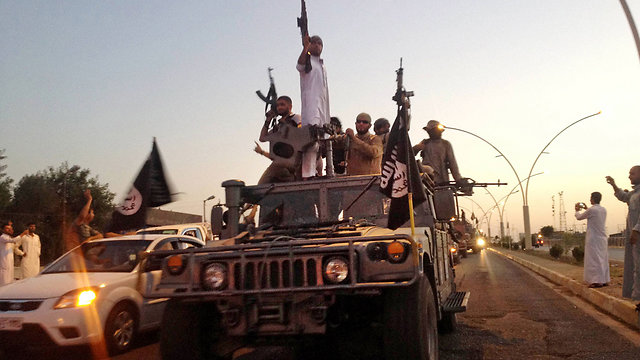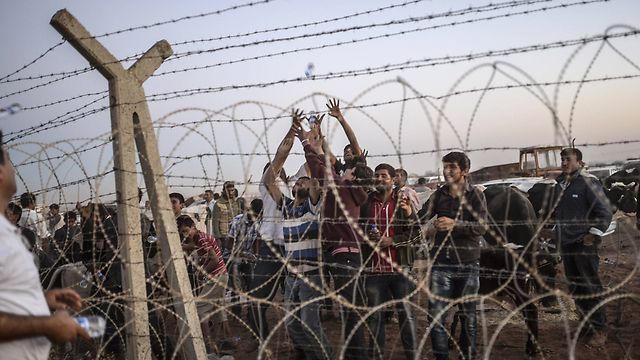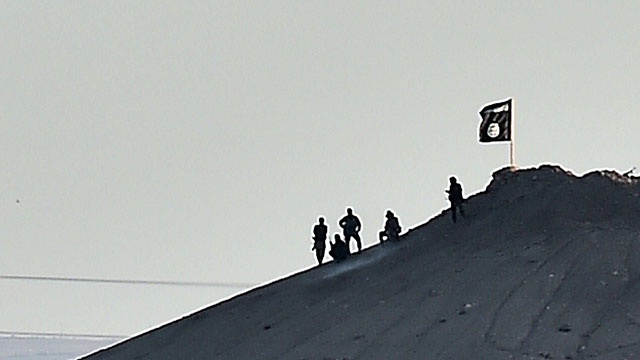Analysis: Turkey, Iran and the now-stricken Syrian regime were all happy to see IS gaining in strength, while Saudi Arabia can be considered its spiritual mother.
The United Arab Emirates on Sunday said it wanted clarification of US Vice President Joe Biden’s recent comments that US allies in the anti-Islamic State coalition support terrorism, with UAE Foreign Minister Anwar Gargash branding Biden’s statements as “far from the truth.” Biden has already apologized for his comments.
The fight against the radical Islamist group is treading water. The Americans have declared that a war against a few thousand hot-headed bearded men with trucks, jeeps and Kalashnikovs will last a lot longer than the war they waged a decade or so ago against an entire standing army in Iraq, in the Gulf War against Saddam Hussein. The slow pace of the war is most certainly related to the US economic crisis and Washington’s fear of yet another entanglement in Iraq.

IS militants parading in Mosul, Iraq (Photo: AP) (?????: AP)
But the principal reason for the slow pace is the reluctance that is being shown by the Arab and Muslim states in the war against the Islamic State militants. The war against the radical organization is exposing the darkest sides of Middle Eastern politics. Most of the countries in the region, including those that have joined the coalition, have also been deeply involved in the creation and strengthening of the organization. And how so?
“Qatar supports Jabhat al-Nusra and Turkey supports IS!” This charged statement was put out there by the speaker of the Lebanese parliament, Nabih Berri. And while the veteran Shiite Muslim leader of the Amal movement is indeed far from being an objective source when it comes to the war underway in Syria, there is nevertheless a great deal of truth in the statement he gave about a week ago to the Syrian news agency, SANA. And Shiite elements aren’t the only ones who are daring to say so; many Sunni commentators in Egypt, Saudi Arabia and the UAE are joining in too. In recent years, Qatar and Turkey have removed themselves from the Sunni axis and are currently viewed by the moderate Arab states as “supporters of terrorism.”
The kingdom v the principality
Last March, Saudi Arabia, the UAE and Bahrain recalled their ambassadors from Qatar following accusations that the principality supports various terror elements that are a threat to the stability of the entire Gulf region. According to numerous reports, the principality of Qatar is drunk with the power it wields over the world by means of its oil money, and has no qualms therefore about supporting the most murderous terror organizations.

UAE female pilot leading strikes against IS (Photo: UAEAF)
The Gulf States have harshly slammed Qatar’s support for organizations that threaten the Saudi kingdom, such as the Islamic State in Iraq and Yemen’s Shiite Houti rebels, who have recently taken over the capital, Sana’a. The Saudis themselves have even criticized Qatar’s support for Hamas – not out of love for Israel of course, but out of hatred instead for the Muslim Brotherhood.
The battle of the egos between the Saudi kingdom and the principality of Qatar has swept across the entire Arab world. Wherever the Saudis support an army, the Qataris support terror: In Egypt, Saudi Arabia support President Abdel Fateh al-Sisi, while Qatar supports the Muslim Brotherhood; in Yemen, the kingdom supports the army and the principality backs the Houti rebels; in Lebanon, the Saudis sent money to the army, while the Qataris financed the jihadists; and in Syria, the Saudis provided assistance to the Free Syrian Army and the Islamic Front, whereas the Qataris aided the jihadists, including Jabhat al-Nusra.
The al-Qaeda link revealed
If there was anyone who doubted Turkey and Qatar’s ties with al-Qaeda, recent events have exposed these countries’ for what they truly are. I’m talking about the release in September of two groups of hostages that were being held by al-Qaeda affiliates – the release of 45 Fijian UN peacekeepers who were being held captive by Jabhat al-Nusra forces in southern Syria, “mediated” by Qatar; and the release of 49 Turkish hostages who were being held captive by IS in Iraq in “a covert rescue operation” carried out by Turkey.
According to reports published on Tuesday evening, the release of the Turkish hostages was secured in return for the release of 180 Islamic State fighters in the hands of the authorities in Ankara. For some reason, when Turkey and Qatar were involved, no one was beheaded on camera and hostages weren’t murdered or raped. Naturally, both states denied charges that they paid ransoms for the release of the hostages.
The Turkish involvement
No Western leader (aside from Biden, who was quick to apologize) has dared to declare in public that the Islamic State has Turkey to thank for the power the organization now wields. A declaration of this kind could, God forbid, undermine the West’s diplomatic-economic ties with the country that inexpensively produces numerous goods relatively close by, in the Mediterranean Basin.

Kurdish refugees at Turkey-Syria border (Photo: AFP)
If we take a look at a map of the Middle East, it’s plain to see that most of the IS volunteers who are not Iraqis or Syrians cannot get to the organization through the countries that surround it: Jordan and Israel have sealed their borders; the Syrian regime and Hezbollah are fighting the group from the west; the Iraqi regime is fighting the organization from the east; and the Saudi army is on constant high alert along the kingdom’s border. In other words, the main loophole is Turkey from the north. Turkey allows thousands of jihadist volunteers from all around the world to cross its borders into the virtual Islamic Caliphate.
The unwritten agreement between the Islamic State group and Turkey includes a struggle to eradicate common enemies, like the Shiite regime in Iraq, the Alawite regime in Syria – and above all, the Kurds in these two countries. Moreover, it was revealed recently that a significant number of Turks have joined the group, including activists from IHH Humanitarian Relief Foundation who participated in the Mavi Marmara flotilla to Gaza in 2010.
The radical Islamist group was undoubtedly born out of the Muslim Brotherhood, a semi-covert Islamic organization that took control of Turkey in the first decade of the 21st century, and of Egypt and Tunisia some two years ago by means of elections and in the wake of the chaos of the Arab Spring. The Turkish-Ottoman vision of reviving the empire via a wave of Islamic revolutions faded with the military coup led by General al-Sisi in Egypt in the summer of 2013.

Strikes against IS in Kobani, Syria (Photo: AFP)
Turkey’s support for the Muslim Brotherhood has given rise to much tension between Ankara and the new Egyptian regime. In November 2013, Egypt went as far as expelling the Turkish ambassador, with Ankara responding in kind. Egypt under al-Sisi recently publicly accused Turkey of supporting terrorism in the Middle East.
Saudi Arabia – the spiritual mother of ISIS
Turkey wasn’t the only one who was happy to see the Islamic State group gaining in strength. Iran and Bashar Assad’s regime refrained from attacking IS as long as the organization busied itself only with wiping out the Sunni rebels in Syria. Iraq’s Shiite regime, too, was happy to sit back and watch the group run wild in the country’s Sunni regions in the east – and thus former Iraqi president Nouri al-Maliki’s regime justified financial aid from the West for its army.
Saudi Arabia, who now leads the support for the war on the Islamic State group, is the organization’s spiritual mother. Saudi Arabia was founded on fanatical Wahhabist ideology, which offered a radical interpretation to the Hanbali school of Islam and viewed all other Muslims as heretics.
Al Arabiya political pundit Khaled al-Dakheel tried a week ago in his column to deny that Wahhabist ideology is the root of the Islamist group’s violence: “IS’s violence did not fall from the skies. Where does it stem from?” he wrote. “What is the difference between it and (Israel’s) occupation in Palestine and the crimes committed by the United States in Iraq? Were the regimes of Saddam and Assad any less violent? The state of violence that has existed in Iraq and Syria for half a century is the backdrop for the crimes of the Islamic State group.”

IS militants place flag atop hill in Kobani (Photo: AFP)
Most countries in the region have a hand in the creation of “the IS monster” – whether through fanatical education (Tunisia, the Gulf States and Saudi Arabia), or for the purpose of battering political rivals (Turkey, Qatar), or due to hatred for the Shia (the opposition in Lebanon and Sunni tribes in Iraq), or for the purpose of taking out other Sunni opposition groups (the Syrian regime, the Iraqi regime). Those involved, however, never imagined that the organization would achieve the strength and size it has, take over oil fields and eventually pose a threat to their very security too. These countries never imagined that their hypocritical policies and ongoing support for terror would be so harshly exposed in the process too. Now, most of the countries in the region are being dragged into the struggle against the Islamic State not due to ideology but rather out of fear and no choice.
The wave of Kurdish refugees who have fled for their lives to southern Turkey and the grou’s unexpected advancement to the Turkish border are what prompted the Turkish parliament to vote last week to join the coalition against the Islamic organization. The decision to join the coalition or not is now in the hands of Turkey President Recep Tayyip Erdogan. Will the coalition aircraft and special forces be allowed to launch strikes from Turkey? A shift in Turkish policy would certainly have significant bearing on the pace of the war.
Dr. Yaron Friedman, Ynet’s commentator on the Arab world, is a graduate of the Sorbonne. He teaches Arabic and lectures about Islam at the Technion, at Beit Hagefen and at the Galilee Academic College. His book, “The Nusayri Alawis: An Introduction to the Religion, History and Identity of the Leading Minority in Syria,” was published in 2010 by Brill-Leiden.



TURKEY ‘PROVIDING DIRECT SUPPORT’ TO ISIS
NATO member giving logistics, intelligence, satellite imagery to terror force
Read more at http://www.wnd.com/2014/10/turkey-providing-direct-support-to-isis/#mj7WPGGLymxqV6zO.99